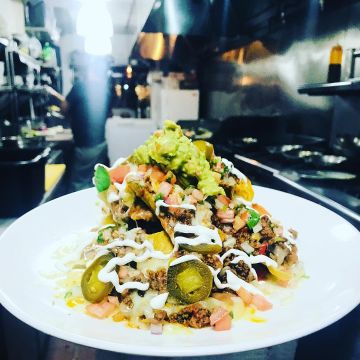Discover the soul of mexican food through traditional recipes
Is Mexican Food Healthy? Unboxing the Nutritional Conveniences of Typical Ingredients
The question of whether Mexican food is healthy welcomes an expedition of its standard active ingredients. Beans and corn work as foundational staples, abundant in protein and fiber. Avocados offer beneficial fats, while various natural herbs and seasonings include flavor and health and wellness advantages - happy hour. Together, these elements create a tapestry of nutrition. The healthfulness of Mexican food often depends on prep work techniques and portion dimensions. What function do these variables play in establishing its total dietary worth?
The Power of Beans: Healthy Protein and Fiber-Rich Staples
Although frequently forgotten, beans function as a foundation of Mexican food, offering a wealth of dietary benefits. Rich in protein, they are an exceptional plant-based alternative for those looking for to meet their dietary protein needs. This high protein content sustains muscle repair service and development, making beans vital for both meat-eaters and vegetarians alike. Furthermore, beans are an extraordinary resource of nutritional fiber, which assists in food digestion and promotes a feeling of fullness, possibly assisting with weight administration.
The variety of beans used in Mexican meals, such as black beans, pinto beans, and kidney beans, contributes to a diverse flavor profile and can enhance dishes nutritionally. Beans are reduced in fat and contain essential vitamins and minerals, consisting of iron, folate, and magnesium. Together, these features make beans an essential active ingredient, delivering both nutrition and nutrition in traditional Mexican fare.

Corn: a Versatile Grain With Nutritional Benefits
Corn stands apart as a functional grain basic to Mexican food, commemorated not only for its culinary applications yet additionally for its excellent dietary profile. As a key active ingredient in dishes like tortillas, tamales, and pozole, corn supplies important nutrients that add to a balanced diet regimen. Rich in carbs, it offers as a considerable power resource, while also being low in fat, making it a beneficial choice for various nutritional requirements.
Furthermore, corn is an excellent resource of dietary fiber, which assists in digestion and advertises satiation. It has significant amounts of vitamins such as B-complex vitamins, which are essential for basal metabolism. The presence of anti-oxidants, particularly carotenoids, contributes to total wellness by reducing oxidative stress and anxiety. Additionally, corn is gluten-free, providing to those with gluten sensitivities. Generally, the dietary advantages of corn underscore its significance in standard Mexican food and its duty in a healthy diet.
Avocados: Healthy Fats and Nutrients in Every Bite
Avocados play a substantial duty in Mexican cuisine, enhancing recipes with their creamy structure and abundant flavor. Past their cooking charm, avocados are commemorated for their outstanding nutritional account. They are an abundant resource of healthy monounsaturated fats, which can assist reduced bad cholesterol degrees and assistance heart health. Furthermore, avocados are packed with crucial nutrients, consisting of potassium, vitamin E, and B vitamins, adding to overall wellness.
The high fiber material in avocados aids digestion and promotes satiation, making them an advantageous addition to any kind of meal. Their unique nutrient structure can likewise sustain skin health and offer anti-inflammatory advantages. Incorporating avocados right into traditional Mexican recipes or appreciating them as a standalone snack can enhance both flavor and nourishment, demonstrating why they are a beloved staple in Mexican cuisine. On the whole, avocados use a delicious way to delight in healthy fats and critical nutrients in every bite.

Herbs and spices: Flavorful Health Boosters
While appreciating the rich tastes of Mexican food, one can not ignore the important duty that spices and herbs play in improving both preference and health and wellness. Components such as cilantro, chili, and oregano peppers not only add to the vibrant taste account yet additionally supply substantial health benefits. Cilantro is recognized for its detoxifying properties, assisting to get rid of heavy metals from the body, while oregano is packed with antioxidants and has anti-inflammatory effects.
Chili peppers, a staple in lots of Mexican recipes, consist of capsaicin, which has actually been linked to boosted metabolism and discomfort relief. Furthermore, seasonings like cumin and coriander assistance digestion and might assist in blood glucose guideline. Incorporating these savory health boosters right into meals not only enhances the cooking experience yet additionally promotes overall wellness, making Mexican food not simply delicious, yet additionally nutritionally beneficial.
Traditional Cooking Techniques: Enhancing Nourishment and Flavor
Traditional cooking techniques in Mexican food play an essential duty in enhancing both nutrition and taste, as they commonly prioritize fresh ingredients and classic techniques. Strategies such as nixtamalization, where corn is saturated and cooked in an alkaline solution, not only enhance the nutrient account of tortillas however additionally boost their digestibility - lunch and dinner. In addition, using slow cooking techniques, like cooking or braising, enables tastes to blend beautifully while maintaining the honesty of the ingredients
Regularly Asked Concerns
Are Mexican Food Portions Normally Larger Than Other Foods?
Mexican food parts are usually larger than those of lots of other foods. This characteristic shows standard dining techniques, highlighting public sharing and hearty meals, which can cause a more significant serving size overall.
Just how Does the Preparation Technique Affect Healthiness of Mexican Food?
Preparation methods substantially influence the healthiness of Mexican food. Methods such as barbecuing or steaming protect nutrients, while frying can increase harmful fat content. Choices of active ingredients and cooking designs inevitably figure out overall dietary worth.
Can Mexican Food Be Customized for Particular Dietary Restrictions?
Mexican food can certainly be tailored for specific nutritional constraints. Substitutions, such as using corn tortillas for gluten-free diet regimens or integrating even more vegetables, enable people to delight in standard tastes while suiting various dietary demands.
What Are Common Mistaken Beliefs Concerning Mexican Food and Health?
Common mistaken beliefs concerning Mexican food consist of the belief that it is inherently unhealthy, overly zesty, and solely concentrated on fats. Actually, traditional meals often feature nutritious components and can be customized to different dietary requirements.
Are There Healthier Options at Mexican Dining Establishments?
Healthier alternatives at Mexican dining establishments usually include smoked meats, beans, and fresh veggies. Selecting recipes that stress whole components and avoiding hefty sauces can cause an extra nutritious dining experience, promoting total wellness.
The range of beans made use of in Mexican dishes, such as black beans, pinto beans, and kidney beans, contributes to a diverse flavor account and can improve dishes nutritionally. Avocados play a significant duty in Mexican cuisine, complementing recipes with their creamy structure and abundant taste. Incorporating avocados right into standard Mexican recipes or appreciating them as a standalone treat can boost both lunch and dinner flavor and nourishment, showing why they are a cherished staple in Mexican food. While appreciating the rich tastes of Mexican cuisine, one can not overlook the essential duty that spices and herbs play in boosting both taste and health and wellness. Traditional food preparation techniques in Mexican cuisine play a necessary role in enhancing both nutrition and flavor, as they typically focus on time-honored strategies and fresh ingredients.